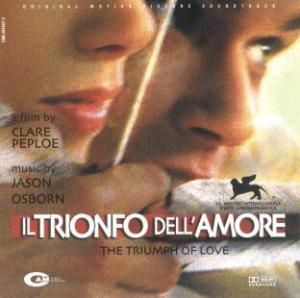Jason OSBORN
Il Trionfo Dell'Amore (The Triumph of Love)
The City of Prague Philharmonic, conducted by the composer OST
CAM 502447-2 [51:38]

Jason Osborn presents a solid pastiche of 18th century music with the soundtrack to "Il Trionfo Dell'Amore", but it is a merry shock it is to hear more contemporary stylizations in its background and instrumentation. Naturally, this technique is nothing new, and is probably more common than one might think (the score instantly reminded me of the baroque-inspired sections of John Williams' "The Paper Chase", although Osborn never sounds quite as humorous); however, it is so rarely done well that "Il Trionfo Dell'Amore", "The Triumph of Love", is among the better of its kind.
"Il Trionfo Dell'Amore" takes its inspiration from the Pierre Marivaux play by the same name, and the film (and a track on the album, regrettably) features notable performers such as Mira Sorvino and Ben Kingsley. The music only flirtingly reveals that it is for a period comedy, apparently a "fight between sense and sensibility" in the Enlightenment age that includes restoring a kingdom, discovering romance, and cross-dressing.
Osborn's softly twisted approach turns on the carefully worked-out filigree of music in the 1700s, especially those works by Mozart, whose 'Arrival of the Princess' from "Don Giovanni" appears, and Rameau, who receives "inspired by" credits from Osborn in what ought to be a Hollywood standard in acknowledging borrowed ideas. Layered over the baroque orchestra and harpsichord solos (by David Rublou) are more recent details -- electric guitar solos by David Gilmour, and synthesized accoutrements & augmentations -- and the irregular musical culture clash of two different styles meeting abruptly.
The resonance on the disc is a bit edgy and, as in many narrative scores, there are obvious moments were the music faces restrictions from specific dramatic demands, but only painful aspect of the album is a song by Osborn and lyricist Louis Fuzelier that sounds atrociously unrestricted with regard to specific listening needs. 'Forets Paisibles' has a charismatic structure influenced by Rameau's "Les Indes Galantes", but the cast performs it much like a band of feral tomcats. It may very well suit the film; all the same, as a listening experience it is excruciating. Woe! I cannot recall the last time I heard so many pitches on so many wrong notes.
The eminently avoidable track aside, "Il Trionfo Dell'Amore" is a welcome surprise. It proves what we all know but rarely give due credit: that disparate styles can weave together in a most unexpected, and enjoyable, dance. Listen to the cue titled 'Phocion!' and hear what I mean.
Jeffrey Wheeler

Return to Index